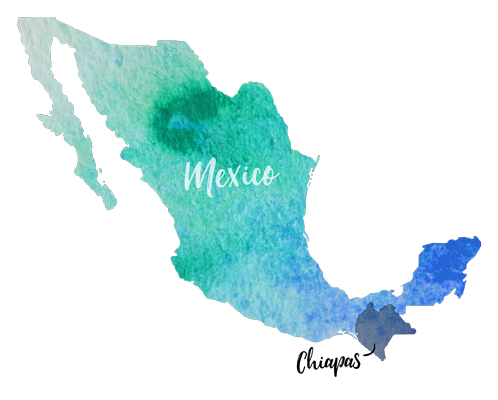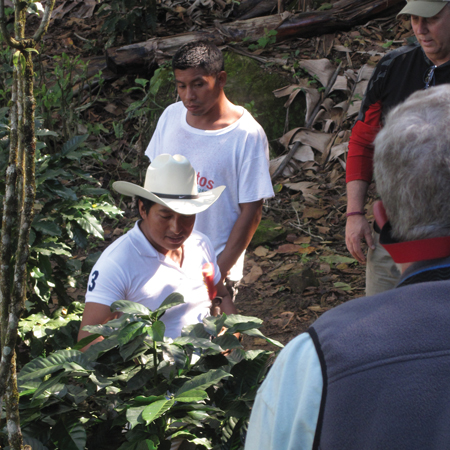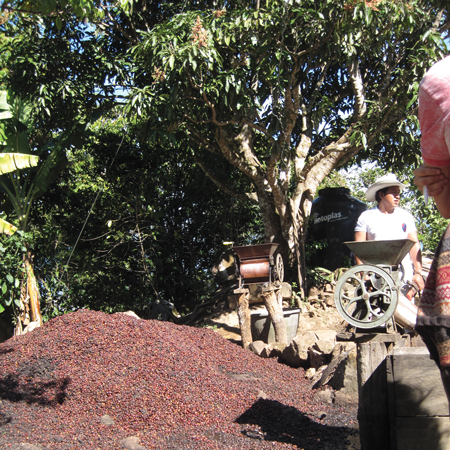Hello, I’m Jacob Witzke, that tall bespectacled fellow serving you made-to-order drinks at our Lyndale Ave. location. Since the completion of our remodel, I have had the honor of supervising the beautiful new coffee and juice bar.
In the midst of the busy winter holiday season, I was asked if I could go on a trip in January to Chiapas, the southernmost state of Mexico. The invitation was from Kickapoo Coffee Roasters, a long-time partner of The Wedge and a featured roaster in our coffee bar. The trip was to focus on coffee sourcing with Cooperative Coffees and community development with On the Ground.
Craft Coffee Beginnings
I quickly said yes, as one does when offered an opportunity to get out of Minnesota during the winter, but I was excited by more than just the prospect of nicer weather. Coffee has long been a passion of mine. Before coming to The Wedge, I worked for years at a small coffee roaster in Iowa owned by my friend Steve. My interest in craft coffee began when he moved into a house up the street and started roasting beans in his basement. My attention was drawn to the large sacks of green coffee in his VW station wagon, the delicious aromas in the autumn air, and the occasional visit by the fire department after a concerned neighbor saw venting smoke.
Journey to Chiapas
 My journey with coffee began all those years ago with Steve, but this journey to Mexico was to begin with a red-eye flight and an overnight at the Atlanta airport. I arrived in Mexico pretty exhausted and on my ride up the mountain everything seemed a little surreal: Rows of corn running vertically up steep slopes rather than flatly, as upon Midwestern fields. Familiar-looking highway markings ignored by drivers making their own lanes. Doritos tasting different.
My journey with coffee began all those years ago with Steve, but this journey to Mexico was to begin with a red-eye flight and an overnight at the Atlanta airport. I arrived in Mexico pretty exhausted and on my ride up the mountain everything seemed a little surreal: Rows of corn running vertically up steep slopes rather than flatly, as upon Midwestern fields. Familiar-looking highway markings ignored by drivers making their own lanes. Doritos tasting different.
Our base of operations was the lovely mountain town of San Cristobal de las Casas. Once there, I finally got a good nights sleep and met the group with whom I was sharing the trip. There were nine of us that traveled down from all over the U.S. We had common interests but quite different backgrounds. Some of us worked at coffee importers, roasters and cafés. Others specialized in education and international outreach. Among the hosts and ourselves there were many perspectives represented that helped us in receiving a fuller picture during our travels.

Coffee Farms
The next three days were made of many excursions by van into the surrounding mountains on narrow, winding roads. We ate lunch with farmers.
We slept in the public auditoriums of small villages. We experienced cultural and historical sites to better understand the region. And of course, we learned about coffee.
We toured the high-elevation farms where Arabica coffee is grown. These usually small parcels of land are often steep-sloped and have a canopy of cultivated fruit trees and native mountain trees that provide the necessary shade for coffee to thrive. Small dirt paths provide the only access to the plants, which must be harvested by hand.

Once the coffee cherries are picked, they are processed onsite at washing stations and dried on concrete patios or rooftops.
Stronger Together
Most of these farms were members of the regional growers’ cooperative, Maya Vinic. Crops are brought to the co-op facility where they are purchased and prepared for export. By joining together, farmers have direct control over all aspects of the product, access to the best equipment, and a larger presence in the marketplace. The collective expertise of the group can assist in organic certification, fighting “la roya” coffee blight, and other challenges more difficult to tackle alone.
I witnessed these strengths of a co-op applied elsewhere. Much of the regional education and government had a structure I found familiar from The Wedge. These mountain regions and the people that live there are quite isolated. In towns it is Mayan languages that are still primarily spoken. Many communities have no access to basic necessities like running water. The indigenous people here have been largely marginalized by Mexican and international politics. Joining together has given them a voice.
Coffee is Just a Piece
One of our guides, Julio, told us that coffee is just a piece. It was easy to see what he meant. It is an important cash crop that can supplement the largely subsistence farming taking place. It is an international product capable of bringing attention to the region.
But it doesn’t affect each family and each community. It is far from the most important thing to most living in Chiapas. Coffee is only a piece, but a piece that I understand better now. The connections, understandings and relationships formed on this trip helped complete the picture.
I was struck by that sense of completeness as I saw Jose, the owner of a lush coffee farm, and Jay, Kickapoo’s head roaster standing beside me. Together we represented many of the roles that get coffee from farm to cup. I couldn’t wait to get back and share with all the caffeine-addicts, casual coffee drinkers, and café-frequenters with a laundry list of instructions for their favorite drink.
Find out more at:
Back to Spring Share 2017 articles